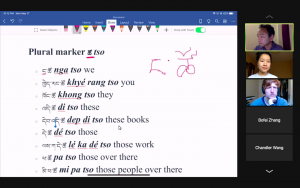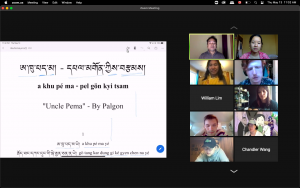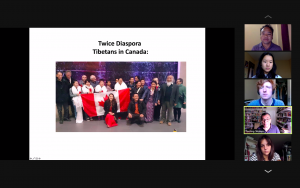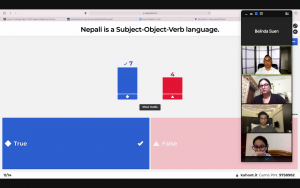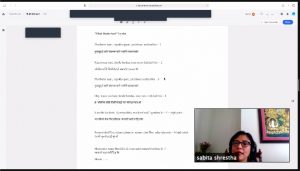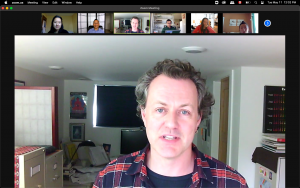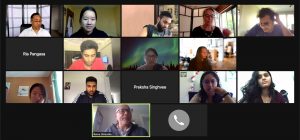2021 marked the sixth summer of our intensive, community-engaged Nepali and Tibetan courses. Take a look below to see what happened!
To read about the Nepali language course (NEPL 390), click here |
|
|
To read about the Tibetan language course (TIBT 390), click here |
Program Overview
The UBC Himalaya Program has offered community-engaged Nepali and Tibetan language courses since 2016. They have grown from 1-week, 1-credit courses to 2-week, 3-credit courses for the fourth year in a row as of the summer of 2021. Due to the COVID-19 pandemic, this year marked the second year that the language courses were held online, although the blend of traditional ‘classroom’ learning and community engagement was maintained in an adapted form. This year’s courses ran daily from Monday to Friday between May 10th – May 21st, 2021.
To build upon instruction with professors Mr. Binod Shrestha (Nepali) and Mr. Sonam Chusang (Tibetan), students practiced language skills and gained intercultural experiences through community engagement activities online. Students learned from and interacted with members of the British Columbian Tibetan and Nepali communities, such as artists, singers, and community leaders.
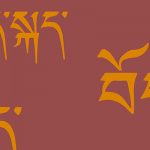 TIBETAN 2021
TIBETAN 2021
Taught by Mr. Sonam Chusang.
Class Experience
Building off of the online materials used last year, Mr. Sonam Rinchen Chusang continued to use digital Tibetan language resources such as Quizlet and interactive digital whiteboards to teach. The Tibetan course led students through the script and pronunciation of the sound system as well as grammar and vocabulary.
“The intensive aspect of the course was very appealing, and I really appreciated Sonam’s patience and generosity throughout the past two weeks in teaching us Tibetan. The way he approached the material made the course very engaging and fun.”
Community Engagement
Different Tibetan and Tibetan-speaking community members joined the class throughout the course. Five Tibetan speaking individuals living in BC joined the classes for one session a week to support the students by providing conversational experience.
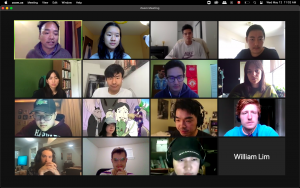
Tibetan language partners introducing themselves to the students before splitting off into breakout groups.
|
Musician Jamyang Yeshi returned again this year to speak to the class about Tibetan music and instruments, and taught everyone how to sing the Tibetan song “Aku Pema.” Students were eager to learn the song in both sessions that Jamyang Yeshi joined. Jamyang Yeshi was also featured in a film called Shining Spirit: The Musical Journey of Jamyang Yeshi, which was discussed in class.
Thangka artist Kalsang Dawa also gave a guest lecture, where he introduced students to his traditional art and creative process. He spoke about the artwork’s connection to Tibetan religion, philosophy, and culture.
|
UBC Professor Tsering Shakya joined one class to speak about an article he wrote on Tibetans in North America, as well as provide an overview of Tibetan history and politics. He answered student questions on the topic from his expertise as a scholar of Tibetan history as well as a member of the Tibetan diaspora himself.
On the last day of class, Lama Rabten Tshering from the Nalandabodhi Vancouver gave a talk about Buddhism in the modern world. Students asked questions to Lama Rabten and practiced their speaking and listening in Tibetan.
“Hearing Lama Rabten speak about Buddhism really piqued my interest on it, and I’ll definitely be visiting a monastery here in Vancouver this summer to learn more.”
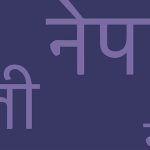
NEPALI 2021
Taught by Mr. Binod Shrestha.
Class Experience
This year, Mr. Binod Shrestha filled the course with different interactive online materials including Kahoot, Quizlet, and YouTube videos to complement lectures and in-class language practice. The course covered lots of ground on Nepali grammar, script, pronunciation, and vocabulary.
“ Something that I didn’t realize going into the course is the breadth of Nepali that it teaches. It gives a really good introduction of the language and it has been amazing, quite honestly.”
Community Engagement
Many members of the Nepali community in British Columbia joined different class sessions throughout the two weeks. During the afternoon of each Friday class, members from Nepali organizations based in BC joined the class to practice conversational Nepali with the students in small groups and 1-on-1 formats. On the first Friday, Manisha Bajracharya, Vice-President of the Nepali Canadian Women’s Society of British Columbia (NCWSBC), gave a guest lecture on how different Nepali festivals are celebrated in BC. After a Q&A period with the students, members of NCWSBC were paired off with students to practice their newly-learned vocabulary and to talk about Nepali food. On the last Friday, the Hindu-Buddhist Foundation of Canada (HBFC) joined the class, and President Madhu Acharya spoke about the history and services of HBFC. Afterwards, members of HBFC as well as monks from the Thrangu Monastery conversed in Nepali with the students 1-on-1 so that students could fully utilize the language skills they had learned over the two weeks.
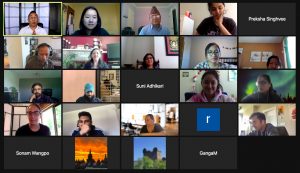
Students speaking with members of the Hindu Buddhist Foundation of Canada (HBFC), as HBFC President Madhu Acharya gives a presentation about the organization.
“Interacting 1-on-1 with the different community language partners took me out of my comfort zone and made me realize how many holes I have in my knowledge of Nepali…the language partners were really understanding throughout it all.”
Nepali community member Sabita Shrestha joined the class once a week to teach students the Nepali song “Phul Butte Sari.” Students were each assigned a line of the song to learn, and the song was performed to members of the Himalaya Program Steering Committee and HBFC on the last day of class. Learning the song helped students read the Nepali script and practice their pronunciation, as well as become acquainted with Nepali pop music.
“Learning how to sing ‘Phul Butte Sari’ from Sabita was such a fun way to learn Nepali, and it brought the class together.”
UBC faculty members and Himalaya Program steering committee co-leads also joined the class to share their expertise in Nepali and Nepali culture. Professor Mark Turin, linguist and anthropologist, visited on the second day of the course to share insight and tips for learning Nepali, as well as its usefulness for various fields, professions, and research interests.
During the second week of the course, professors Sara Shneiderman and Ratna Shrestha joined a class to speak about their recently published co-authored article that explored dynamics of the Nepali diaspora in BC. They answered questions from the students about the article, as well as the ramifications of the 2015 earthquakes that hit Nepal and how Nepali community groups in BC responded.
“Even though I came into the course as an external student, it was a very welcoming environment. My fellow students were very collegial and Binod-ji was helpful and patient.”
To receive up-to-date information about our courses and programs, please sign up for our mailing list.
These courses are supported by the Department of Asian Studies, UBC Faculty of Arts, the Teaching and Learning Enhancement Fund (TLEF), the Centre for Community Engaged Learning (CCEL), the School of Public Policy & Global Affairs / Institute of Asian Research, and UBC Go Global.
